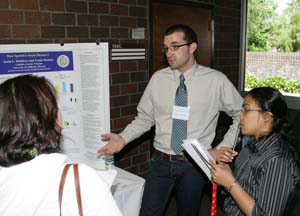

Justin Matthews wasn’t really thinking about cognitive science until he met
Professor Teenie Matlock. In fact, he was applying for Ph.D. programs elsewhere.
But Matthews, who studied and researched social psychology, worked as a teaching assistant for cognitive scientist Matlock. When the two connected, they formed an award-winning combination that has changed Matthews’ mind about his postgraduate work.
He was studying social psychology, examining interactions and perceptions between people and how attitudes about other people form. But once Matlock explained
cognitive science, Matthews saw how her methods might work with his
research, and applied to become one of her graduate students.
Recently, Matthews, 27, from Exeter, was honored as producing the “Outstanding Doctoral Student Poster” at the 28th annual Central California Research Symposium at California State University, Fresno. His poster addresses his experiments into whether “social distance” is actually spatial.
Matthews, who’s working toward becoming a professor, was the only representative from UC Merced this year, but said he hopes Bobcats will continue to take part in the symposium in the future.
“In attendance were students, professors and administrators from all over the central part of the state,” Matthews said, “and UC Merced is now a part of the Central Valley.”
The poster that won Matthews a cash award - he thinks it’s $250 but won’t know until he gets the check next month - is an analysis of people’s perceptions of social distance in terms of actual space. It’s a topic that might not have drawn Matthews attention if not for his work with Matlock, whose research is all about how people perceive and label concepts like time and space.
“Now, my research combines cognitive science and social psychology,” Matthews said. “It takes a special environment to get to know someone who studies something so different from what you do and find ways to work together.”
But that’s what he found at UC Merced, and what he hopes the undergraduate students who now work on his research teams will discover, too.
“It’s like the best of both worlds here,” Matthews said. “You’re at a research university, but you have the class sizes of a teaching university.”






